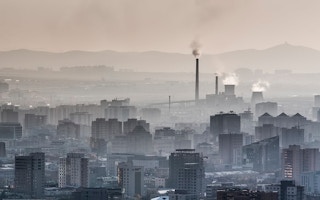To move forward on tackling climate change, rich nations need to win back the trust of developing countries by providing more finance to help them reach their goals on adopting clean energy, the head of the International Energy Agency (IEA) said.
As mid-year UN climate talks in Bonn stumbled over the issue, Fatih Birol, executive director of the IEA, told Context industrialised nations must accept their historical responsibility for causing climate change and step up help for other countries to shift off planet-heating fossil fuels.
“In the absence of support, them giving prescriptions to developing countries… ‘do this, don’t do that,’ would be neither productive nor fair,” he said in an interview during a visit to India for discussions ahead of September’s G20 summit.
This week, the Net Zero Tracker research initiative said that 148 nations and the European Union - about three-quarters of countries - had now set a net-zero goal, indicating “a clear consensus to curtail greenhouse gas emissions to net zero”.
But at the national level, the implementation of those goals is slow, partly due to a lack of finance in poorer countries.
The IEA is also advocating for two other global climate goals: a tripling of installed renewable energy capacity and a doubling of energy efficiency by 2030.
At the Bonn talks, some developing economies – big users of fossil fuels today – demanded that a push to boost targets to cut global emissions further should be accompanied by negotiations on increasing finance so they can play their part.
“
It’s very unfair and this can be solved very easily with financing to increase solar capacity. I realised that all the major countries converge in the idea that the future belongs to clean energy. This was a very good sign.
Fatih Birol, executive director, International Energy Agency
Wealthy countries pushed back, arguing that discussions on climate finance are already happening, and they also want bigger emerging economies and the private sector to pay up.
This impasse held up the adoption of the meeting agenda until the eve of the final day of talks on Thursday.
Solar solution
Birol said the rift in trust between developed and developing nations could be fixed with relatively simple solutions.
For example, one of the biggest energy challenges today is that every second person in the African region has no access to electricity, while the continent gets 40 per cent of solar radiation.
Solar is the cheapest source of electric power and yet Africa generates less solar electricity than the Netherlands.
“It’s very unfair and this can be solved very easily with financing to increase solar capacity,” Birol said.
Birol said he had first proposed new global targets on renewables and energy efficiency at the G7 summit in Japan in May, also attended by leaders of developing countries including India, Brazil, Indonesia and Egypt.
“I realised that all the major countries converge in the idea that the future belongs to clean energy. This was a very good sign,” Birol said.
He is pushing for all countries to get behind these goals in the fight against climate change at December’s COP28 UN summit in Dubai, calling it “the most important meeting this year”.
The IEA chief said that today, global energy investment is about US$2.7 trillion, with roughly US$1 trillion of that going to fossil fuels and US$1.7 trillion to clean energy.
While clean energy investment has grown steadily since the 2015 Paris Agreement on climate change, more than 90 per cent of the growth has come from advanced economies and China.
That puts the onus on richer economies “to assume their historical responsibility and make sure that clean energy investment in developing countries also grows as fast as needed”, Birol said, adding that energy transition should be a key theme for India as this year’s G20 host.
In addition, he called for the world’s development banks to be given a mandate to provide clean energy financing and more flexibility to support poor nations in their energy transition.
“What kind of (financing) instruments they are going to use is up to those institutions, but in my view, it should be a key priority for them,” he said.
Rise in renewables, EVS
Birol said the global energy crisis triggered by the Russia-Ukraine war - which roiled oil and gas markets - had made all countries recognise the importance of having access to clean energy for improved energy security and geopolitical stability.
He noted how the conflict had given clean energy a push forward - for example, in 2022, of all new power plants built in the world, more than 80 per cent run on renewables, with solar increasing by 40 per cent, while energy efficiency improvements doubled.
Investment in renewables outpaced spending on oil production last year - and there has been an explosion in electric car sales worldwide, Birol added. Two years ago, one in every 25 cars sold was electric - a ratio that is now one in five.
“We see a clean energy transition happening much faster than many people realise,” he added.
This story was published with permission from Thomson Reuters Foundation, the charitable arm of Thomson Reuters, that covers humanitarian news, climate change, resilience, women’s rights, trafficking and property rights. Visit https://www.context.news/.

















